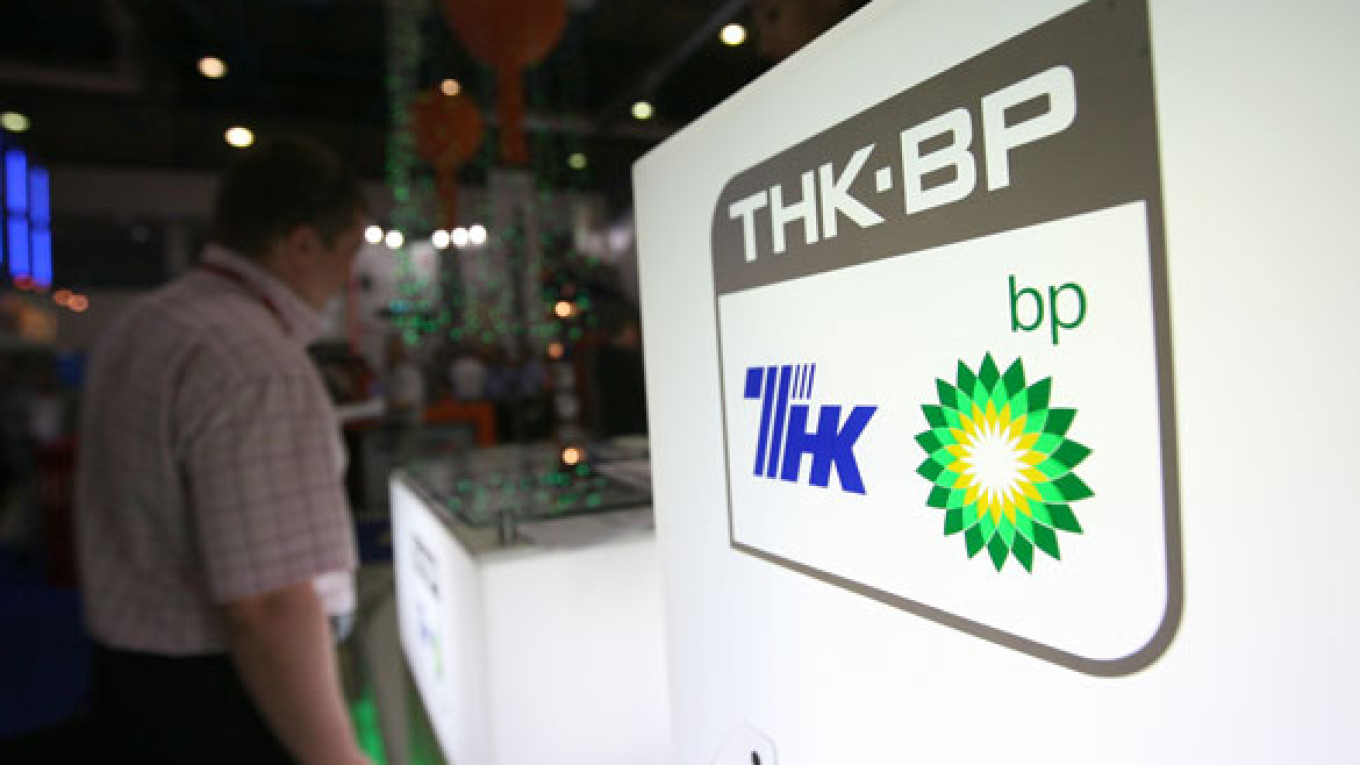BP has agreed to consider quitting its Russian joint venture in a move that could strip the British company of almost a third of its output and reverse the biggest investment in the Russian oil industry.
If BP sells its 50 percent share in TNK-BP, the deal could hand control in the venture to its four Soviet-born billionaire partners.
TNK-BP could also take on a new shareholder, possibly a government-controlled company like Rosneft.
In a curt statement Friday, BP said it intended to “pursue a potential sale” of its 50 percent stake in TNK-BP in response to “unsolicited approaches.”
“There can be no guarantee that any transaction will take place,” the statement warned.
BP's announcement came after TNK-BP co-owner Mikhail Fridman said one of the 50-50 partners — who had often feuded over management and strategy — needed to cede control to the other.
BP refused to identify the suitors, but the announcement gives the billionaires the right to require that the British company first negotiate with them, said a source familiar with the situation.
The freeze on talks with any other bidders, spelled out in the TNK-BP shareholder agreement, will last 135 days.
The company that represents the billionaires — Alfa Access Renova, or AAR — reiterated in a statement Friday that it was interested in expanding its shareholding in TNK-BP.
AAR chief Stan Polovets said AAR made a preliminary proposal to buy BP's stake in TNK-BP about a month ago, Bloomberg reported.
AAR said in the statement that BP had not informed it who the potential buyers were and what the terms of the potential transaction might be. It added that since its inception in 2003, “fundamental differences over strategy and governance” developed between the partners.
“It has become apparent that the parity ownership structure has become inoperable,” the statement said.
Spokespeople for BP and AAR declined to comment further.
Another potential suitor could be Rosneft, said Darya Kozlova, an analyst at brokerage Rye, Man and Gor Securities. Rosneft's new chief executive, Igor Sechin, a confidant of President Vladimir Putin's, reportedly has a mandate to grow the company through acquisitions — and Kozlova said it can easily borrow enough money for the deal. Or, the state-controlled oil producer could pitch in its treasury stock that's about to swell to 12 percent of the total, she said.
Sechin told reporters in Berlin, where he was accompanying Putin on a visit, that Rosneft had never thought about replacing BP in TNK-BP but would look at the option now.
“We need to study the full extent of the information and make a decision afterward,” he said, Interfax reported.
A source close to the matter said a Russian state-owned oil and gas group is one of the parties that asked BP to sell its share in TNK-BP, Reuters reported from London.
It's hard to predict how much BP could raise from the sale. TNK-BP Holding, the listed unit of TNK-BP, is believed to be trading at a discount.
Its value dropped 10 percent on the news of BP's potential exit. Kozlova said shareholders were wary that a new co-owner would reduce the company's generous dividend payouts.
With the addition of TNK-BP's foreign assets in Vietnam, Brazil and Venezuela, that share price valued TNK-BP at $34 billion.
AAR rejected a BP buyout offer of about $32 billion in the spring of last year.
BP's shares climbed 5 percent Friday.
If BP sells out, the company could exit the Russian market, with its high taxes on oil production and export, or it could partner with a state-controlled company in higher-growth projects. BP's attempt to join forces with Rosneft last year fell apart after AAR challenged the deal in court, arguing it ran counter to their shareholder agreement.
BP likely “is hoping for a place in Russia,” said Ivan Mazalov, a director at asset manager Prosperity Capital in charge of the oil and gas portfolio.
TNK-BP accounts for about 30 percent of BP's total output. Roughly 14 percent of BP’s profit last year came from dividends from its TNK-BP assets.
While BP contributed about $8 billion to set up TNK-BP with AAR, it reaped $19 billion in dividends since then.
If BP leaves Russia, it would follow in the footsteps of ConocoPhillips, which divorced its private Russian partner in 2010 by selling its 20-percent holding in LUKoil.
A Message from The Moscow Times:
Dear readers,
We are facing unprecedented challenges. Russia's Prosecutor General's Office has designated The Moscow Times as an "undesirable" organization, criminalizing our work and putting our staff at risk of prosecution. This follows our earlier unjust labeling as a "foreign agent."
These actions are direct attempts to silence independent journalism in Russia. The authorities claim our work "discredits the decisions of the Russian leadership." We see things differently: we strive to provide accurate, unbiased reporting on Russia.
We, the journalists of The Moscow Times, refuse to be silenced. But to continue our work, we need your help.
Your support, no matter how small, makes a world of difference. If you can, please support us monthly starting from just $2. It's quick to set up, and every contribution makes a significant impact.
By supporting The Moscow Times, you're defending open, independent journalism in the face of repression. Thank you for standing with us.
Remind me later.


